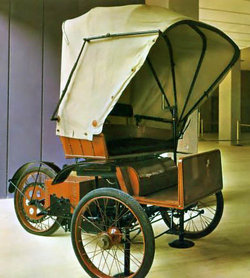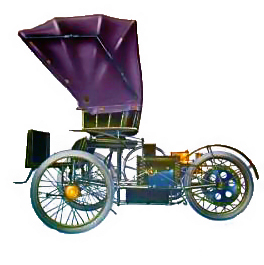Difference between revisions of "Bernardi"
m |
m |
||
| Line 1: | Line 1: | ||
{{X}} | {{X}} | ||
| − | {| border=1 cellspacing=3 cellpadding=4 style="float:right; margin:0 0 .5em 1em; width: | + | {| border=1 cellspacing=3 cellpadding=4 style="float:right; margin:0 0 .5em 1em; width:250px; background:#505050; border-collapse:collapse; border:1px solid #999; font-size:83%; line-height:1.5; " summary="Infobox Automobile" |
|- style="text-align:center; background:#505050;" | |- style="text-align:center; background:#505050;" | ||
| colspan=2 style="padding:0; background:#505050; color:#fff; border-bottom:1px solid #999;" |[[Image:1896 Bernardi.jpg|250px]] | | colspan=2 style="padding:0; background:#505050; color:#fff; border-bottom:1px solid #999;" |[[Image:1896 Bernardi.jpg|250px]] | ||
Latest revision as of 21:40, 17 November 2011

| |
| 1896 Bernardi Model 3 1/2 HP | |
|---|---|
| Engine | rear, 1 flat cylinder |
| Capacity | 624 cc |
| Max power output | 3.5 bhp at 800 rpm |
| Max speed | 35/40 Km/h |
| Weight | 270 kg |
| Gearbox | Three-speed |
1894 - 1901
Bernardi (Societa Italiana Bernardi, later La Società Miari Guisti (1894)) was founded in Padua in 1899 by Enrico Bernardi. Enrico Bernardi built the first "motorcycle" that rode on the Italian roads and also built the first motor car to travel the Italian roads. He did research on internal combustion engines at the University of Padua in 1884 and built his first engine that drove a sewing machine.
Soon he shifted his attention to the motorcyclists and in 1894 he had his motorized bike ready. He built a four-cylinder horizontal engine with detachable head, overhead valves and a centrifugal inlet valve regulator, constant-level carburetor with float and spray nozzle, incandescent ignition with platinum heat sponge, and geometrically correct steering. The engine sat on a trailer that would push the bike. Acceleration was done with a pneumatic rubber ball (like a squeeze horn). By squeezing the ball gave the engine gas and upon releasing, you went slower.
The goal was to resume the operation of the dissolved car manufacturer Bernardi again. The company planned the production of small cars with four wheels and engines with a capacity of 2.5 to 6 hp similar of that of the three wheelers of the day. Professor Enrico Bernardi, one of the fathers of the automobile, did not belong to the company's management and was only involved in the planning, but in the end, the company was dissolved.
A company (Società Miari Guisti) was created to sell the machines and to settle patents, but that once a production has started is unlikely. Even today, Bernardi auxiliary engines are available, probably named after Enrico Bernardi and provides both gasoline all electric motors.
Send what you have to:
| Car Information and Photos by Marque: A - B - C - D - E - F - G - H - I - J - K - L - M - N - O - P - Q - R - S - T - U - V - W - X - Y - Z |
| Motorcycle Information and Photos by Marque: A - B - C - D - E - F - G - H - I - J - K - L - M - N - O - P - Q - R - S - T - U - V - W - X - Y - Z |
